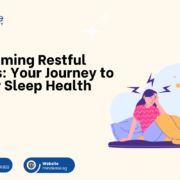Reclaiming Restful Nights: Your Journey to Better Sleep Health
Sleep is not a luxury but rather a fundamental pillar of wellbeing that touches every aspect of our lives. When we sleep well, we think clearly, feel emotionally balanced, and our bodies repair and rejuvenate. Yet for many people in Singapore, quality sleep remains frustratingly elusive, creating a ripple effect that impacts relationships, work performance, and overall life satisfaction.
Understanding When Sleep Becomes a Struggle
Sleep difficulties manifest in various ways, and recognising these patterns is the first step towards healing. Some individuals find themselves lying awake for hours, minds racing with thoughts from the day or worries about tomorrow. Others fall asleep easily but wake repeatedly throughout the night, unable to return to the deep, restorative sleep their bodies crave.
The statistics paint a concerning picture. Research indicates that 27.6% of Singapore residents experience poor sleep quality, making our island nation one of the most sleep deprived in the world. This isn’t simply about getting fewer hours of sleep but about the quality and continuity of rest that allows our minds and bodies to truly recover.
Sleep disorders encompass more than occasional restless nights. They include persistent insomnia, sleep apnoea, restless leg syndrome, and various sleep wake cycle disruptions. These conditions often intertwine with stress, anxiety, and depression, creating complex patterns that require thoughtful, professional intervention.
Therapeutic Approaches for Lasting Change
Sleeping disorder therapy in Singapore has evolved significantly, embracing both evidence based clinical methods and holistic approaches that address the person as a whole. The most effective treatments recognise that sleep issues rarely exist in isolation. They’re often symptoms of deeper imbalances in our mental, emotional, and physical wellbeing.
Cognitive Behavioural Therapy for Insomnia (CBT-I) stands as a cornerstone treatment, helping individuals identify and modify thoughts and behaviours that interfere with sleep. This approach teaches practical skills like sleep hygiene, relaxation techniques, and stimulus control, empowering people to reclaim their relationship with rest.
Advanced therapeutic methods, including hypnotherapy, work directly with the subconscious mind to address underlying patterns and beliefs that may be disrupting sleep. These approaches can be particularly effective when traditional methods haven’t provided lasting relief, offering a pathway to deep, transformative change.
Sleeping disorder therapy in Singapore also encompasses integrated care models where sleep specialists, psychologists, and holistic practitioners collaborate to create comprehensive treatment plans. This multi disciplinary approach ensures that all contributing factors are addressed. From medical conditions to lifestyle patterns to emotional wellbeing, everything gets the attention it deserves.
The Transformative Power of Professional Support
Seeking professional help for sleep difficulties takes courage, yet it’s often the turning point towards genuine recovery. Qualified sleep therapists provide more than just techniques. They offer understanding, expertise, and personalised strategies that fit your unique circumstances and lifestyle.
Professional support creates a safe space to explore the root causes of sleep difficulties without judgment. Many people discover that their sleep issues stem from unresolved stress, past experiences, or deeply ingrained habits that require gentle, skilled intervention to change.
The journey with sleeping disorder therapy in Singapore often begins with comprehensive assessment, allowing therapists to understand your specific sleep patterns, challenges, and goals. This foundation enables the development of tailored treatment plans that address not just symptoms, but the underlying factors contributing to poor sleep.
Moreover, professional therapists can identify when sleep issues may be connected to other health conditions, ensuring appropriate referrals and collaborative care when needed. This holistic perspective is crucial for achieving lasting improvement.
Creating Your Personal Sleep Sanctuary
While professional therapy provides essential guidance and support, creating an environment and routine that promotes quality sleep is equally important. Your bedroom should become a sanctuary. Cool, dark, and quiet, dedicated primarily to rest and relaxation.
Establishing consistent sleep and wake times helps regulate your body’s natural circadian rhythms, even on weekends and holidays. This regularity signals to your body when it’s time to wind down and when it’s time to feel alert and energised.
Consider the hours before bedtime as preparation time for sleep. Gentle activities like reading, light stretching, or meditation can help transition your mind and body from the day’s activities to a state conducive to rest. Limiting screen time and avoiding stimulating activities in the evening supports this natural progression towards sleep.
Nutrition also plays a vital role in sleep quality. Light evening meals, avoiding caffeine late in the day, and staying adequately hydrated throughout the day while reducing fluid intake close to bedtime can significantly impact your ability to fall and stay asleep.
Embracing Hope and Taking Action
If sleep difficulties have been affecting your life, know that change is possible. Sleep disorders are highly treatable conditions, and with the right support and approach, you can rediscover the restorative power of quality rest.
The decision to seek help is a powerful step towards reclaiming your wellbeing. Every person’s journey is unique, and what matters most is finding the approach and support that resonates with your needs and circumstances.
Remember that healing takes time, and progress may not always be linear. Be patient with yourself as you implement new strategies and work with professionals to address underlying patterns. The investment you make in your sleep health will pay dividends in every area of your life. Improved mood, better concentration, stronger relationships, and enhanced physical health.
Your journey to better sleep begins with a single step. Whether that’s scheduling a consultation, implementing better sleep hygiene, or simply acknowledging that your sleep difficulties deserve attention and care, you’re already moving in the direction of positive change. Quality sleep isn’t just a dream but an achievable goal that can transform your daily experience and overall quality of life.

